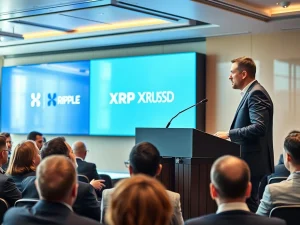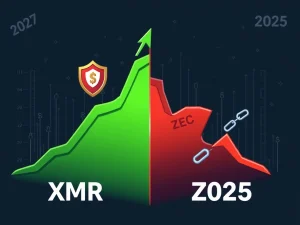BlackRock: The Astonishing 3% Bitcoin Hoard and Its Market Impact

The world’s largest asset manager, BlackRock, has made a significant move in the cryptocurrency space. Through its iShares Bitcoin Trust (IBIT), BlackRock has quietly accumulated a substantial portion of the total Bitcoin supply. This level of **BlackRock Bitcoin** ownership is a major development, signaling a new phase for institutional involvement in the digital asset market.
Understanding BlackRock’s Massive Bitcoin Holdings
Since its launch on January 11, 2024, the **iShares Bitcoin Trust** (IBIT) has experienced unprecedented growth. As of June 10, 2025, BlackRock holds over 662,500 BTC within the trust. This figure represents more than 3% of Bitcoin’s total supply.
Here’s a breakdown of the scale:
- **Total BTC Held:** Over 662,500 BTC
- **Percentage of Total Supply:** More than 3%
- **Value (at current prices):** Approximately $72.4 billion
To put IBIT’s growth into perspective, consider this comparison:
- It took SPDR Gold Shares (GLD), a major gold ETF, over 1,600 trading days to reach $70 billion in assets under management.
- IBIT achieved this milestone in just 341 days, making it the fastest-growing ETF in history.
This rapid accumulation highlights the strong appetite for **Institutional Bitcoin** exposure through regulated products.
Why BlackRock is Betting Big on Bitcoin
BlackRock’s significant allocation reflects a strategic view of Bitcoin as a legitimate component for long-term, diversified portfolios. Their internal analysis embraces Bitcoin’s volatility as a trade-off for its potential upside. With **IBIT**, they are betting that wider adoption will lead to:
- Improved price discovery
- Increased liquidity
- Narrower trading spreads
This philosophy, coming from the world’s largest asset manager, sends a powerful signal to other financial institutions. It shifts the conversation around institutional adoption from ‘if’ to ‘how much’ exposure is appropriate.
The Investment Case for Institutional Bitcoin
BlackRock highlights several factors making Bitcoin appealing:
- **Scarcity:** Bitcoin’s fixed supply (21 million coins) and halving schedule create digital scarcity, similar to gold. Lost or inaccessible coins further tighten the effective supply.
- **Fiat Alternative:** Bitcoin’s decentralized nature offers a hedge against risks associated with sovereign debt and geopolitical fragmentation. It acts as a neutral reserve asset.
- **Digital Transformation Proxy:** BlackRock sees Bitcoin as representing the broader shift to digital value systems across finance, commerce, and wealth transfer.
These factors provide unique risk-return characteristics. BlackRock frames Bitcoin as offering "additive sources of diversification," making a case for its integration into mainstream portfolios.
Integrating Bitcoin into Traditional Portfolios
BlackRock advocates for a measured approach to integrating Bitcoin. They suggest a 1% to 2% exposure within a traditional 60/40 stock-bond portfolio mix. While this percentage seems small, its impact is significant at the institutional scale. It helps normalize Bitcoin exposure for conservative investors.
They also benchmark Bitcoin’s risk profile against volatile equities, such as major tech stocks, to show how it fits within standard portfolio models.
Impact of the Bitcoin ETF on the Market
BlackRock’s decision to accumulate over 3% of Bitcoin’s supply via its **Bitcoin ETF** is a pivotal moment. Historically, Bitcoin’s volatility was influenced by its fixed supply, sentiment shifts, and regulatory uncertainty. Thin liquidity meant large trades had significant impact.
With IBIT absorbing hundreds of thousands of BTC, there’s a debate:
- **Supporters argue:** Institutional investment through regulated vehicles increases liquidity, transparency, and stability. BlackRock believes broader participation improves price discovery and deepens market liquidity.
- **Critics warn:** Large institutional involvement introduces traditional market risks like leveraged trading, algorithmic flash crashes, and price manipulation via ETF flows. This financialization might trade retail-driven volatility for systemic, leverage-based risk.
ETFs like IBIT also offer a familiar, regulated structure for exposure, especially for institutions hesitant about direct crypto ownership complexities. This normalizes **Institutional Bitcoin** ownership, accelerating its inclusion in traditional portfolios and making access easier for retail investors through standard brokerages.
The Centralization Paradox: BlackRock’s Bitcoin Holdings
Bitcoin was designed as a decentralized alternative to centralized finance. However, the world’s largest asset manager buying over 600,000 BTC through a centralized vehicle like **IBIT** creates a paradox: a decentralized asset is increasingly held by centralized institutions.
Most users interact with Bitcoin via centralized platforms (exchanges, custodians, ETFs) due to ease of use, security features, and regulatory compliance. While Bitcoin’s base layer remains decentralized, access points are often centralized. BlackRock’s accumulation is a prime example.
Some view this as undermining Satoshi’s vision, while others see it as a necessary "centralization of access" needed for global scaling. The market currently operates on a hybrid model: decentralized base layers with centralized access points.
Regulatory Catch-Up Game
The approval of spot **Bitcoin ETF** products by the US SEC in early 2024 enabled BlackRock’s launch of IBIT. This ruling opened doors for institutional capital. However, the broader regulatory landscape remains inconsistent.
Asset classification is a major challenge. The SEC’s stance on whether tokens like Ether or Solana are securities remains unclear. This regulatory uncertainty hinders the development of products like staking ETFs or altcoin ETPs and confuses market participants.
For the wider crypto market to mature, a more consistent and globally aligned regulatory framework is essential. Institutions are ready, but they require clear, trustworthy rules.
Conclusion
BlackRock’s accumulation of over 3% of the total Bitcoin supply through its **iShares Bitcoin Trust** is a landmark event. It underscores the growing acceptance of Bitcoin as a legitimate asset class by the world’s largest financial players. While raising questions about centralization, this move provides mainstream legitimacy, simplifies access for investors, and significantly impacts market dynamics. The rapid success of **IBIT** signals strong and sustained interest in **Institutional Bitcoin**, paving the way for further integration into the global financial system, even as regulatory clarity is still needed for the broader crypto market.










